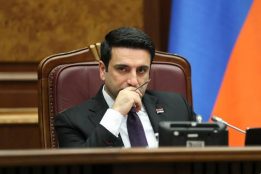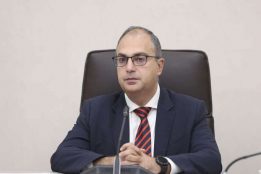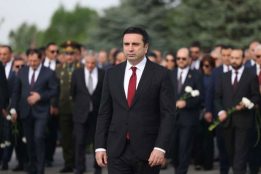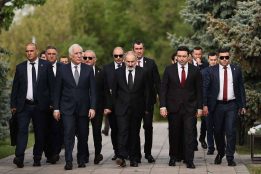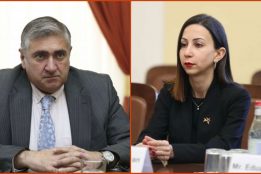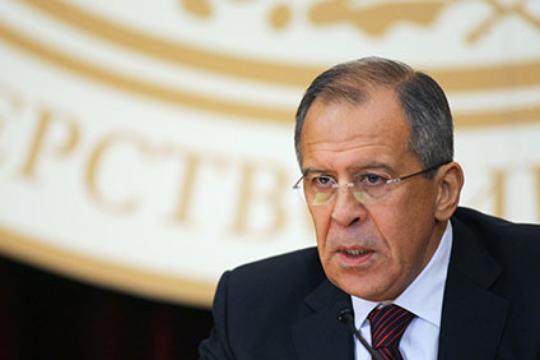
The Jamestown Foundation published Dumitru Minzarari’s recent article about Russia’s foreign policy. Dumitru Minzarari is an OSI Doctoral Fellow with the Department of Political Science at the University of Michigan-Ann Arbor. Previously he worked as a foreign and security policy analyst with the Moldova-based IDIS “Viitorul” think tank writing on national and international security.
US Secretary of State Hillary Clinton’s recent remarks about Russia’s efforts to “re-Sovietize” the countries of the former Union of Soviet Socialist Republics have apparently touched a nerve with the Kremlin. Secretary Clinton warned that the United States is well aware of Russia’s intentions to rebuild its control over the former Soviet republics via extended regional integration and institutionalization under the benign-looking labels of the Customs Union or Eurasian Union. She also revealed that the US is trying to think of ways to slow this process down or prevent it (Vz.ru, Kyiv Post, December 7).
Clinton’s explicit comments at the Organization for Security and Cooperation in Europe (OSCE) December 6 ministerial in Dublin caused quite a stir among Russia’s top officials. President Vladimir Putin caustically retorted that the US accusations were nonsense. He pointed to the common language, similar mindsets, as well as interconnected transportation and energy infrastructures as natural factors pushing Russian-led integration in the post-Soviet space. He even referred to the European Union as an integration project that restrains the national sovereignties of its member states even more than the USSR’s Supreme Soviet decision framework used to (Vz.ru, December 10).
Other officials followed the Russian president’s lead, including State Duma Speaker Sergei Naryshkin, and the Duma’s Commonwealth of Independent States (CIS) Committee Chair Leonyd Slutskyi. Naryshkin stated that US interference in the Eurasian integration processes was unacceptable (Vz.ru, December 10). Slutskyi reasoned that since the Eurasian Union is going to become a major global player, Clinton’s statement in Dublin was an effort to preserve the US-dominated unipolar world (Vz.ru, December 8).
Two essential ideas can be observed in the Russian officials’ emotional responses. First, the Russian statements, including last year’s explanation by Vladimir Putin during the presidential campaign, attempt to clarify Moscow’s intention to transform the Eurasian Union into one of the global poles of power, connecting Europe and the Asia-Pacific region (Izvestia.ru, October 3, 2011; Vz.ru, December 10). Russia’s envisaged continental Western Europe-CIS-Asia axis would thus leave the United States a lesser role in world affairs.
But how exactly is a Moscow-led Eurasian Union supposed to become a global pole of power? Russia’s goal is to turn this grouping into a chorus that will sing in international forums with one voice under a Kremlin choirmaster. The integration mechanism that Russia is willing to implement should create the necessary asymmetric dependencies that would consolidate its leadership position within such a union. For instance the recovery of Soviet-era common transportation and energy infrastructure would magnify economic and political dependence on Russia among many future Eurasian Union members. In the developing economies of the CIS countries, natural gas plays the role of a public good with pronounced social welfare effects. When delivered at low prices—as Russia is willing to offer in exchange for often painful concessions from its importers—natural gas has the potential to significantly affect the political capital of the national leaders. Russia also represents a huge market with lower standards for produced goods, making it more accessible for post-Soviet states.
Integration shall, by Moscow’s design, allow CIS country leaders to slightly improve their citizens’ standard of living through Russian-subsidized deliveries of cheap natural gas, a wider common union job market and other social benefits that Russia’s neighboring economies are not able to provide for their domestic constituencies alone.
With so much economic and political influence, Russia will then be able to promote its preferred candidates in national elections along its periphery—and will basically own the national governments. Such an outcome would also trigger a diffusion into neighboring countries of Russia’s political system, which is a form of “smart authoritarianism” mimicking democratic institutions and processes. This type of governance forces its citizens to trade between some minimal level of social welfare assured by the government in exchange for giving up many individual freedoms. The emergence of the Russian-led Eurasian Union would produce a wave of authoritarianism, slowly spreading from East to West, until it reached the borders of the EU.
The second idea revealed by the Russian officials’ impassioned responses to Secretary Clinton reflects the sharp unease that Moscow feels about Washington’s potential attempts to hinder its “gathering of the post-Soviet lands.” The Kremlin understands well that its offers to post-Soviet states may be rendered less attractive by alternative offers from the West, and its constraining mechanisms may, therefore, become ineffective if the targeted governments are supported by the US and the EU.
Consequently, in addition to its diplomatic moves, Russia is making significant efforts to strengthen its military tool of foreign policy. Moscow believes that modernizing its strategic nuclear capabilities to enable Russia to penetrate US missile defense systems would deter the United States from interfering into Russia’s foreign affairs. It is also massively funding its conventional forces, permitting Moscow to create facts on the ground that other actors would have to accept. Currently, Russia is believed to be the third largest defense spender in the world, after the US and China, with its defense expenditures being slightly over three percent of its GDP; while its combined “national defense” and “national security” spending totals over 30 percent of Russia’s annual budget (newizv.ru, October 18). It plans to increase its 2013 defense spending by over 25 percent compared to the current year (Ng.ru, July 19), leading some Russian experts to suggest Moscow is preparing for war (Ria.ru, November 17, 2011).
All these actions indicate that the new Putin administration is consistently building both military and diplomatic tools to support its declared goal of building the Eurasian Union. They also suggest the Kremlin is resolute in limiting interference from the West, willing to militarily deter any possible resistance to the fait accompli reality Moscow is attempting to create in the post-Soviet space.

















